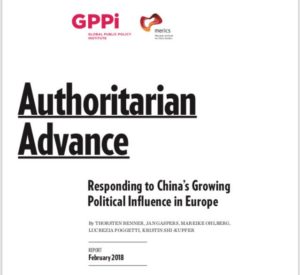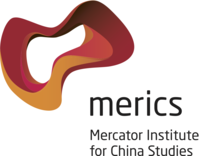 Two new studies suggest that Europe’s embrace of China, even as it warns against Russian meddling, might benefit from a certain degree of wariness. When it comes to Beijing, they argue, leaders of European Union countries appear too willing to overlook China’s authoritarian ambitions, The Washington Post reports:
Two new studies suggest that Europe’s embrace of China, even as it warns against Russian meddling, might benefit from a certain degree of wariness. When it comes to Beijing, they argue, leaders of European Union countries appear too willing to overlook China’s authoritarian ambitions, The Washington Post reports:
“Political elites in the E.U. and its close neighbors have started to embrace Chinese rhetoric and interests, including where they contradict national or European interests,” write Thorsten Benner, Jan Gaspers, Mareike Ohlberg, Lucrezia Poggetti and Kristin Shi-Kupfer, in a study released Monday and financed by the Global Public Policy Institute and the Mercator Institute for China Studies, two Berlin-based think tanks. …. China’s offers to Europe, a recent study by the European Council on Foreign Relations’ François Godement and Abigaël Vasselier concluded, are “are not very different from those offered to African and other developing nations: a flurry of projects creating competition among recipients, loans at commercial rates, and a strong insistence on identical statements and agreements.”
 China’s rapidly increasing political influencing efforts in Europe and the self-confident promotion of its authoritarian ideals pose a significant challenge to liberal democracy as well as Europe’s values and interests, according to the study, “Authoritarian Advance: Responding to China’s Growing Political Influence in Europe”:
China’s rapidly increasing political influencing efforts in Europe and the self-confident promotion of its authoritarian ideals pose a significant challenge to liberal democracy as well as Europe’s values and interests, according to the study, “Authoritarian Advance: Responding to China’s Growing Political Influence in Europe”:
While Beijing’s efforts have received much less scrutiny than the efforts of Putin’s Russia, Europe neglects China’s increasing influence at its own peril. Drawing on its economic strength and a Chinese Communist Party (CCP) apparatus that is geared towards strategically building stocks of influence across the globe, Beijing’s political influencing efforts in Europe are bound to be much more consequential in the medium- to long-term future than those of the Kremlin.
 “Very few outsiders see Putin’s Russia as a successful model for sustained growth and development, and Russia invests less in building stocks of influence,” the [Mercator] researchers explain. “By comparison, the CCP leadership’s buildup of influence across Europe is reinforced by China’s emerging status as a successful socioeconomic model. . . . It is China that is set to be the bigger long-term challenge to Europe’s values and interests.”
“Very few outsiders see Putin’s Russia as a successful model for sustained growth and development, and Russia invests less in building stocks of influence,” the [Mercator] researchers explain. “By comparison, the CCP leadership’s buildup of influence across Europe is reinforced by China’s emerging status as a successful socioeconomic model. . . . It is China that is set to be the bigger long-term challenge to Europe’s values and interests.”
Now that Russia has shown how cyber tactics and informational subterfuge can upend established democracies, China will surely be taking some pages from the Kremlin’s playbook. Chinese President Xi Jinping has made it clear that maintaining domestic stability and burnishing China’s image abroad is the name of the government’s game, analyst Kent Harrington writes for Project Syndicate:
Similarly, strategists at the People’s Liberation Army (PLA) are likely poring over the Kremlin’s handiwork to inform their own cyber-war tactics. Chinese strategic thinking about “political warfare” holds that an adversary’s political, social, and economic institutions – particularly the media – should be targeted before a shooting war ever begins. To that end, Russia’s diffusion of bogus news and conspiracy theories through its state-funded media outlets RT and Sputnik could prove instructive.
 A sound diagnosis is necessary in order to devise an appropriate response, notes Christopher Walker, Vice President for Studies and Analysis at the National Endowment for Democracy. Authoritarian governments are not playing by the rules governing democracies, he writes:
A sound diagnosis is necessary in order to devise an appropriate response, notes Christopher Walker, Vice President for Studies and Analysis at the National Endowment for Democracy. Authoritarian governments are not playing by the rules governing democracies, he writes:
Systematic repression is the autocratic regimes’ calling card, and the “sharp power” they generate cannot be shoehorned into the familiar and reassuring framework of “soft power.” Without more precise terminology, the world’s democracies will have little hope of countering these states’ increasingly multifaceted influence.
China sees the Trump administration’s perceived isolationism as a “historic opportunity” to assert its own leadership on the world stage, the Communist Party’s flagship People’s Daily newspaper spelled out on its front page last month, NBC News adds:
 The party is pushing China’s growing global ambitions through both words and actions. While it has consolidated President Xi Jinping’s authoritarian hold on power, promoted its $1.4 trillion “Belt and Road” initiative linking Europe to Asia, and taken on key roles on international bodies including the U.N., there is a “soft power” aspect as well. Recent blockbuster movies, TV shows and even rap music have also taken on a pro-China zeal.
The party is pushing China’s growing global ambitions through both words and actions. While it has consolidated President Xi Jinping’s authoritarian hold on power, promoted its $1.4 trillion “Belt and Road” initiative linking Europe to Asia, and taken on key roles on international bodies including the U.N., there is a “soft power” aspect as well. Recent blockbuster movies, TV shows and even rap music have also taken on a pro-China zeal.
Calls to shut down a Chinese government-sponsored Confucius Institute at UMass is part of a broader wave of opposition to these centers, which currently operate on hundreds of college campuses worldwide, with more than ninety in the United States, according to China Digital Times:
 The centers are financed by the Chinese government and overseen by a branch of the Chinese Ministry of Education known as Hanban. Advertised as tools to promote Chinese language education and cultural exchange, these institutes have drawn controversy in recent years due to fears over Chinese government interference in the choice of curriculum and appointment of faculty. Amid growing concerns about censorship and propaganda, the University of Chicago ended its partnership with the Confucius Institute in 2014, after more than 100 professors signed a petition calling for the school to cut the centre. . … Leeza Hirt, a junior at Columbia University and an editor of The Current, looks at efforts by the Columbia administration to steer clear of potentially contentious discussions about its Confucius Institute.
The centers are financed by the Chinese government and overseen by a branch of the Chinese Ministry of Education known as Hanban. Advertised as tools to promote Chinese language education and cultural exchange, these institutes have drawn controversy in recent years due to fears over Chinese government interference in the choice of curriculum and appointment of faculty. Amid growing concerns about censorship and propaganda, the University of Chicago ended its partnership with the Confucius Institute in 2014, after more than 100 professors signed a petition calling for the school to cut the centre. . … Leeza Hirt, a junior at Columbia University and an editor of The Current, looks at efforts by the Columbia administration to steer clear of potentially contentious discussions about its Confucius Institute.
A controversial Australian book on China’s growing influence will finally be released next month, reports suggest:
 Late last year concerns about free speech and academic freedoms were raised when publisher Allen & Unwin shelved a book on China’s growing global influence out of fear of legal action by Being’s “agents of influence.” The book, “Silent Invasion“, was written by Clive Hamilton, a respected public ethics expert at Charles Sturt University, and delves into how Chinese Communist Party agents have tried to extend Beijing’s influence into Australia “for strategic and political gains.”
Late last year concerns about free speech and academic freedoms were raised when publisher Allen & Unwin shelved a book on China’s growing global influence out of fear of legal action by Being’s “agents of influence.” The book, “Silent Invasion“, was written by Clive Hamilton, a respected public ethics expert at Charles Sturt University, and delves into how Chinese Communist Party agents have tried to extend Beijing’s influence into Australia “for strategic and political gains.”
The question of foreign interference in Australian politics hasn’t ended with Sam Dastiyari’s political capitulation. The events of 2017 weren’t even the end of the beginning, The Strategist adds:
 In the same week as the Dastiyari scandal, a report from the US-based think tank National Endowment for Democracy (NED) raised more warnings about covert influence on democracies by China and Russia. This new form of ‘sharp power’—a phrase coined in the NED report—exploits liberal institutions, especially free speech, independent media and electoral democracy. Strengths become weaknesses; Sun Tzu would be proud.
In the same week as the Dastiyari scandal, a report from the US-based think tank National Endowment for Democracy (NED) raised more warnings about covert influence on democracies by China and Russia. This new form of ‘sharp power’—a phrase coined in the NED report—exploits liberal institutions, especially free speech, independent media and electoral democracy. Strengths become weaknesses; Sun Tzu would be proud.
Similar reports by Oxford’s Computational Propaganda Research Project, Freedom Houseand researchers from Harvard, Stanford and the University of California at San Diego have shown how governments use tactics like feigning grassroots support (‘astroturfing’) and targeting campaigns through ‘hashtag poisoning’. China, the Philippines, Turkey and Mexico have all been called out for targeting domestic political opponents and civil society groups. Russia and China are also implicated in international campaigns of covert or malign influence.
China is perfecting a vast network of digital espionage as a means of social control—with implications for democracies worldwide, according to ANNA MITCHELL, a researcher at Stanford University, and LARRY DIAMOND, a senior fellow at the Hoover Institution and at the Freeman Spogli Institute at Stanford University. China’s experiments with digital surveillance pose a grave new threat to freedom of expression on the internet and other human rights in China, they write for The Atlantic:
Increasingly, citizens will refrain from any kind of independent or critical expression for fear that their data will be read or their movements recorded—and penalized—by the government. And that is exactly the point of the program. Moreover, what emerges in China will not stay in China. Its repressive technologies have a pattern of diffusing to other authoritarian regimes around the world. For this reason—not to mention concern for the hundreds of millions of people in China whose meager freedom will be further diminished—democracies around the world must monitor and denounce this sinister creep toward an Orwellian world.







